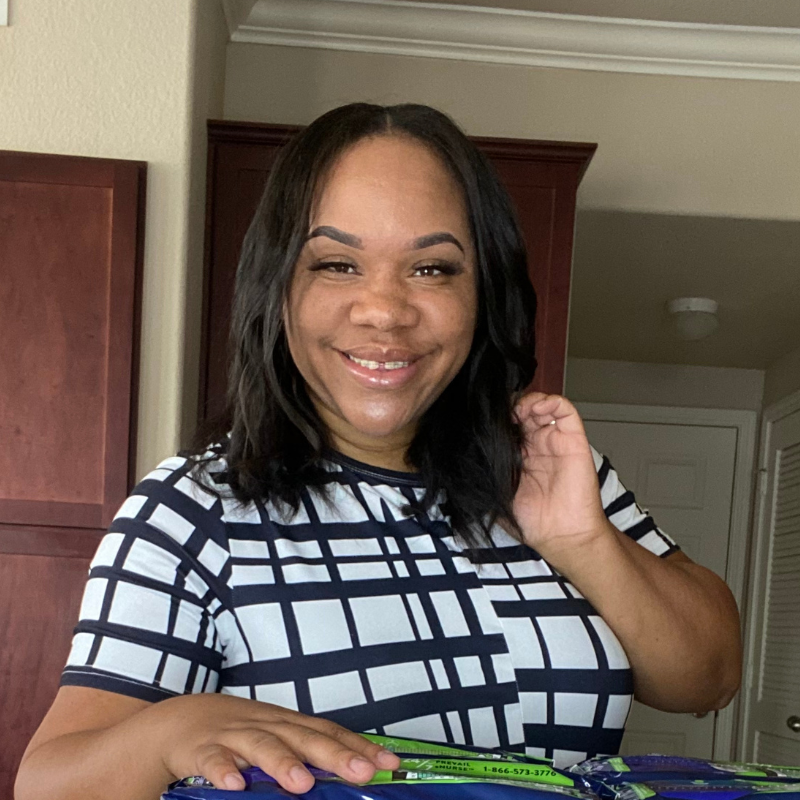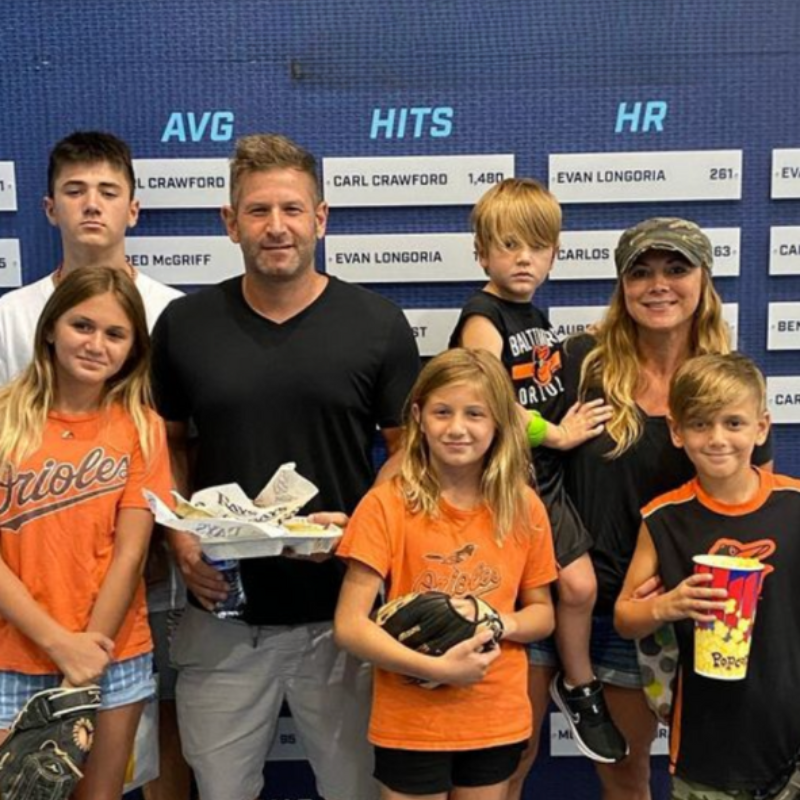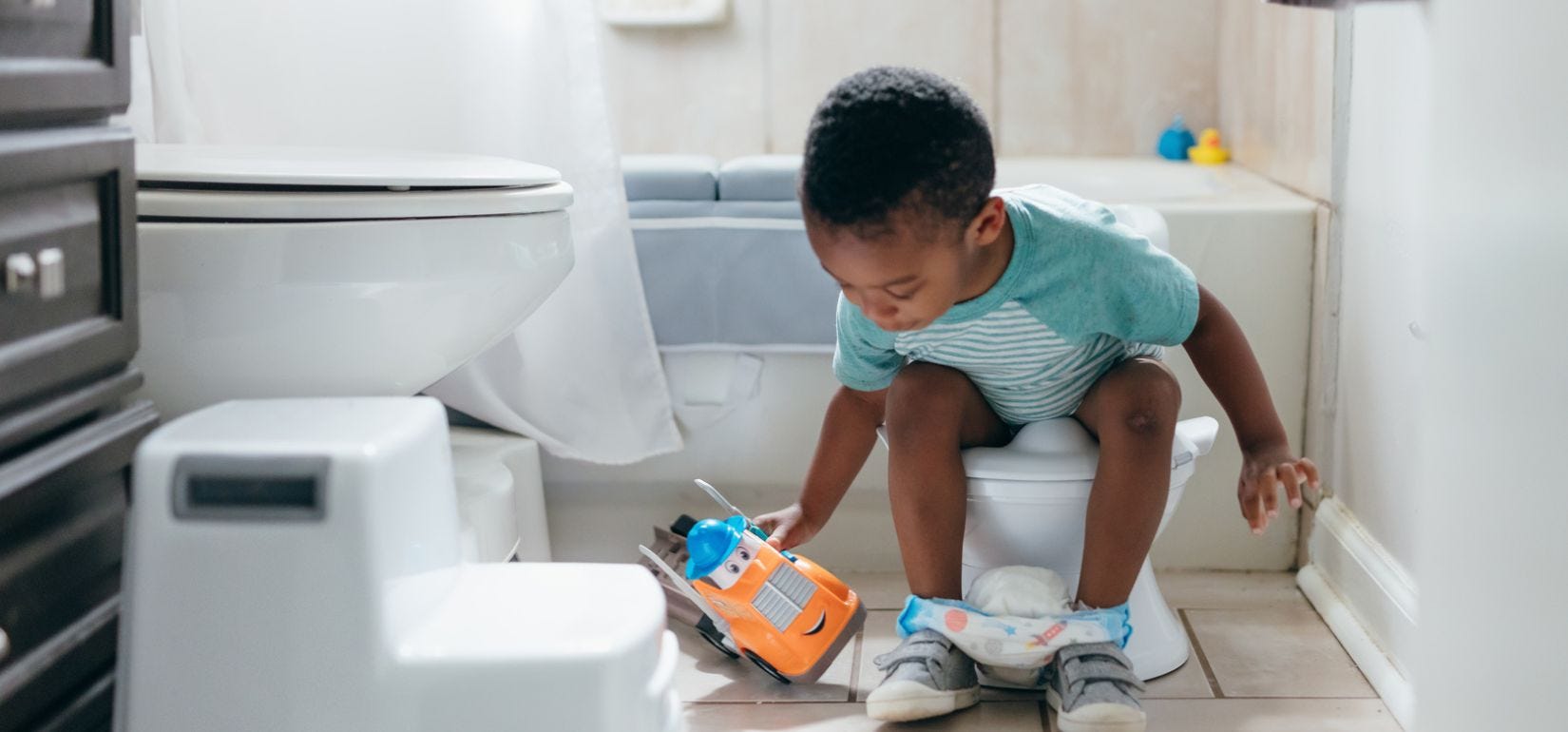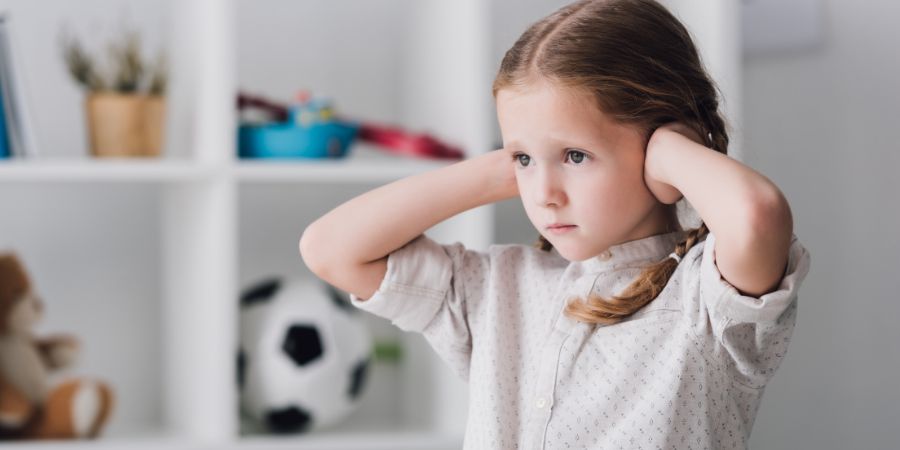Guest Writers: Marc Orem and Camille Robinson
Raising a child with a special need can be a joy, and at times, a challenge. Along the way, you may not recognize signs that may delay your child’s ability to care for themselves, or you may not realize that there are certain things you need to teach them how to do that other children may be able to do alone, such as toilet training, brushing their hair, and taking a bath.
In this article, Marc Orem, father of Cal, and Camille Joy, mother of Maison, both children with autism, give their best tips on how to help your loved one develop a positive self-care routine they can stick with for life.
Check Your Eligibility
In Under 2 Minutes!
Discover incontinence supplies available through your insurance plan.
Jump To:
INCONTINENCE PRODUCTS THROUGH INSURANCE:
Aeroflow Urology is in-network with many Medicaid and Medicaid-managed insurance plans and is accredited by Medicaid. Complete our Eligibility Form, and we’ll automatically check to see if your plan covers incontinence supplies. ***Must meet certain requirements to qualify.***
You will also receive the care and attention every person managing incontinence deserves: A personalized list of 100% insurance-covered incontinence supplies, a dedicated Continence Care Specialist you can contact during business hours, a user-friendly online portal for easy monthly reordering, and educational content.
Get the continence care you need with the dignity you deserve. Join the Aeroflow Urology family today! It only takes 5 minutes to get started.
Understanding Autism & Self-Care Challenges
Q: How can people understand self-care challenges that come with autism?
Marc: When you're talking about self-care and autism, there are so many unique challenges because all of these kids are different and present different challenges. There's the ability to progress and gain functions where you didn't see them before, and then there are regressions. It's a give and take. Many times, you'll wake up and notice something lost, something gained, and then something gained, something lost.
Potty training is a big one. Even eating, there's such a limited diet. Brushing teeth, brushing hair, showering— those kinds of things are at the top of the list when you talk about self-care. These are things that many other kids are able to accomplish at a young age, moving through the steps and stages from one thing to the next. This usually happens pretty quickly in typical kids, but it's much different for kids who are autistic.
Camille: Along this journey, it is both rewarding and difficult at times, but I’ve learned to love the child that I am raising unconditionally without wishing or deeply desiring for him to be different or typical.
Maison is not able to really care for himself at all. We do all of the essential care things for Maison, like brushing his hair, brushing his teeth, washing his face, taking a bath, and using the bathroom.
Something that was very helpful to me was getting training by his BCBA. Maison doesn't like to fill the bathtub up with water. He does really like water sitting on him in that way so she helped me to understand why things were difficult for Maison to endure (baths and haircuts especially) and what kind of sensory input and output he needed.
Teaching Toilet Training
Toilet training is a large part of teaching self-care to a child with a disability, but Marc and Camille have helpful tips and insights you can use with your child.
“Potty training is hard. It just is. Life is so much easier when we learn how to use toilet facilities, that’s just a fact. But, we have to meet these kids where they are and at the place where they're comfortable in trying new things,” says Marc.
“Every child is different, and what I’ve learned in this and what works for me may not work for you, but it doesn't hurt to try. We started off by going straight to the toilet. We skipped the purchase of a potty chair. We started with a timer for every half hour and now we go every 45 mins or 1 hour,” says Camille.
Marc's Tips
- Make sure kids are comfortable. Is there an issue like constipation that bothers them? If so, trying to add even more to the potty process will be hard. Are they afraid of the toilet flushing? Things like that matter and can be a barrier to potty training.
- Use videos or pictures about potty training.
- Set times for potty training. Set times by saying things like “We’re going potty in 15 minutes.”
- Reward your child. Rewards can be helpful, but they can’t be the reason to learn potty training. Try rewarding when it’s unannounced and unexpected.
- Expect regression. Regression in potty training will happen. We’re going through it right now, basically back to square 1. Meet your child in their own time.
- Take breaks. It’s okay to take breaks. Humans need a break, both parents and kids. Sometimes both need a break at the same time.
Camille's Tips
- Recognize readiness signs. Sometimes your child won't show signs of readiness but you can decide based on age. That's what I did.
- Create a consistent routine. Consistency is crucial when helping your child get used to the toilet, and getting some children with sensitivity used to the bathroom sounds is also important.
- Use visual aids & social stories. We used visual aids to help Maison remember what comes after using the toilet, like washing hands, pulling up pull-ups, getting dressed, etc.
- Use positive reinforcement & rewards. We used unreal candies as a reinforcer in the beginning, and that candy has no dyes or yucky stuff!
Using Incontinence Products
Using incontinence products may be a large part of your child’s life, and it can be difficult to teach them how to use them. But with Marc and Camille’s tips, it may be simplified!
“I think reinforcing that incontinence products, like diapers in our case for Cal, really help him. I think for him, and probably a lot of kids, it helps to make it into an activity,” says Marc.
“We knew that it was time to introduce incontinence products when we moved from that smaller size pull-up that you buy in the store to a size that is not there,” says Camille.
Marc's Tips
- Make using the products into a positive activity. The products from Aeroflow Urology get delivered right to our door in a box, so you can’t tell what they are; it just looks like a box from a company. Cal would look out the window and call them his “presents.” Try telling your child that it’s time to take out the items and count and arrange them to reinforce that incontinence products are a positive thing.
Camille's Tips
- Get your child comfortable wearing the products. Social stories really helped with Maison being comfortable in pull-ups.
- Maintain dignity and privacy. Dignity and privacy is always important. I try to make sure when we are out I cover his waistline and his clothes are fitting correctly so that he's not exposed.
Teaching Hair Care
Hair care is another important aspect of self-care for kids with autism, even if it’s something you might not think about regularly.
“I tell people all the time that this is something many parents don't think about. I didn't think about it when we first got into all of this. Hair care for autistic kids is really a strategy. The reason why is because so many of these kids just don't like getting their hair cut due to sensory issues, the noise, the blades, and everything else,” says Marc.
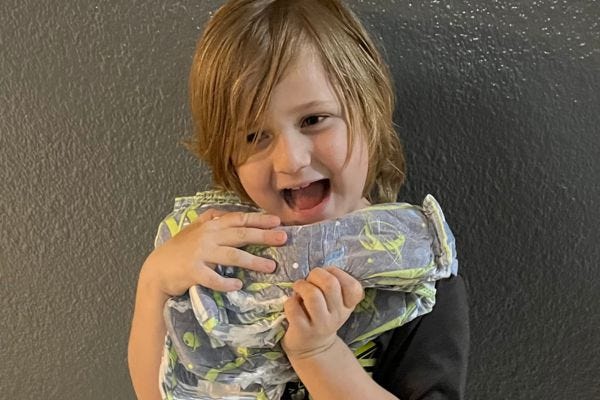

Marc's Tips
- Wash your child’s hair with their head back. One of the things we did for washing Cal’s hair was to always do it with his head back. He understands that when his head goes back, it’s time to start washing his hair. This helps keep the products out of his eyes and mouth.
- Brush your child’s hair right away. After washing, you have clean hair, but then you have a lot of wet hair. Part of the process of ending the shower is brushing the hair. This is not something that comes later after getting dressed or another activity. We brush Cal’s hair right away.
Teaching Dental Hygiene
Dental hygiene can be difficult for children with autism who have sensory sensitivities, but Camille has a tip that may make it easier.
“Dental hygiene has always been one of the biggest challenges for us because of Maison’s sensory needs. He does not like to brush his teeth and it's always a fight,” says Camille.
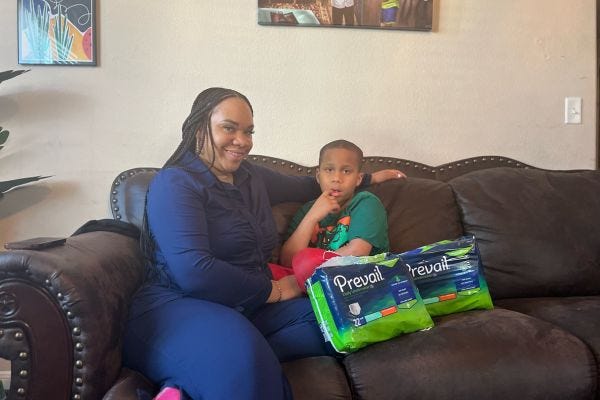

Camille's Tips
- Use what your child loves to encourage them. One thing that I've found beneficial is using what Maison loves to get him through brushing his teeth and that's music. I play a song about brushing your teeth. I sing and dance and this helps him to tolerate brushing and flossing just a little more. I make it a whole musical show!
Teaching Dressing & Undressing
Dressing and undressing can be a challenge for children with disabilities due to the buttons and zippers on clothes, but keeping it simple and wearing adaptive clothing can be helpful.
Marc's Tips
- Keep it simple. There are a million ways to do this, but we really try to avoid buttons and zippers. For Cal, the primary reason is that anything like that can become a choking hazard. Some of these kids are incredibly strong and will continue to work at something until they can disassemble their clothing.
- Use adaptive clothing. We try to keep it really simple with a lot of elastic bands, making everything easy on and easy off. There are some outfits that Cal prefers more than others, primarily due to sensory or color preferences.
Tips for Building a Self-Care Routine
Q: What are your main tips for building a self-care routine for children with autism?
Marc: I think one of the most important criteria in building out a self-care routine for your child is understanding that whatever you establish is probably going to be the way the child sees it for the foreseeable future. When a lot of these ASD kids get into routines, it's very hard to change them. So, make sure it works for you, the parent. Ensure it's something you can be a part of or able to help with, considering your day-to-day activities, whether it's work or other kids. It could be a variety of things, but just make sure it works for you first, because inevitably, your child will need your help and direction.
Also, consider the sequence of events: When does A lead to B, B lead to C, and so on. For instance, Cal will always get a shower before dinner. He doesn't ask for dinner before his shower; he understands the sequence. He gets his end-of-the-day shower, and then it's dinner.
Build the routine to fit your daily schedule because once they lock into it, there will be an expectation on the child's part that that's how it's going to go. Make sure you build it out in a way that works for you and your family.
Camille: Self care is important for every human, not just adults. I saw a need for Maison to have a routine because he didn’t sleep well. I know for me, I love aromatherapy, so I decided to give him a self-care scent that’s lavender. We have that scent for bath-time care, and it's important to introduce these things early so that when they grow old, they will have a routine for themselves.
Supporting Parents in Self-Care
Q: How can parents get support when caring for their child with autism?
Marc: There's no doubt that asking for help from other parents is a secret weapon. So many of us don't do that for various reasons. I struggled with it for a long time. On the flip side, what works for other people won't necessarily work for you, your child, and your family. There's a fine line and flexibility in asking for ideas—some will work, and some won't.
Inevitably, you'll be able to share things with the larger special needs community. There are great resources online. You can go to any social media platform and type in almost anything to find the right people that you vibe with and want to connect with. Social media and podcasts offer tons of resources.
It's easy to feel lost and confused in the beginning. Everything is a little foggy, but you will get the hang of it. Then, all of a sudden, you're helping everybody. It's kind of like the saying, "It takes a village." Someone will help you, and then you'll help somebody else.
Camille: Having a community along this journey of raising a child with special needs has been a breakthrough for us. I learned the value of hearing from other parents who had children with special needs and I learned so much about resources available.
I encourage parents to share what they have learned with other parents. You never know what people are going through and in need of.
Don't forget to take care of yourself along this journey. So many times we pour out to our family but we forget ourselves. You deserve to be on the list of priorities too. You can't pour from an empty cup.
Disclaimer
Information provided on the Aeroflow Urology website is not intended as a substitute to medical advice or care from a healthcare professional. Aeroflow recommends consulting your healthcare provider if you are experiencing medical issues relating to incontinence.




